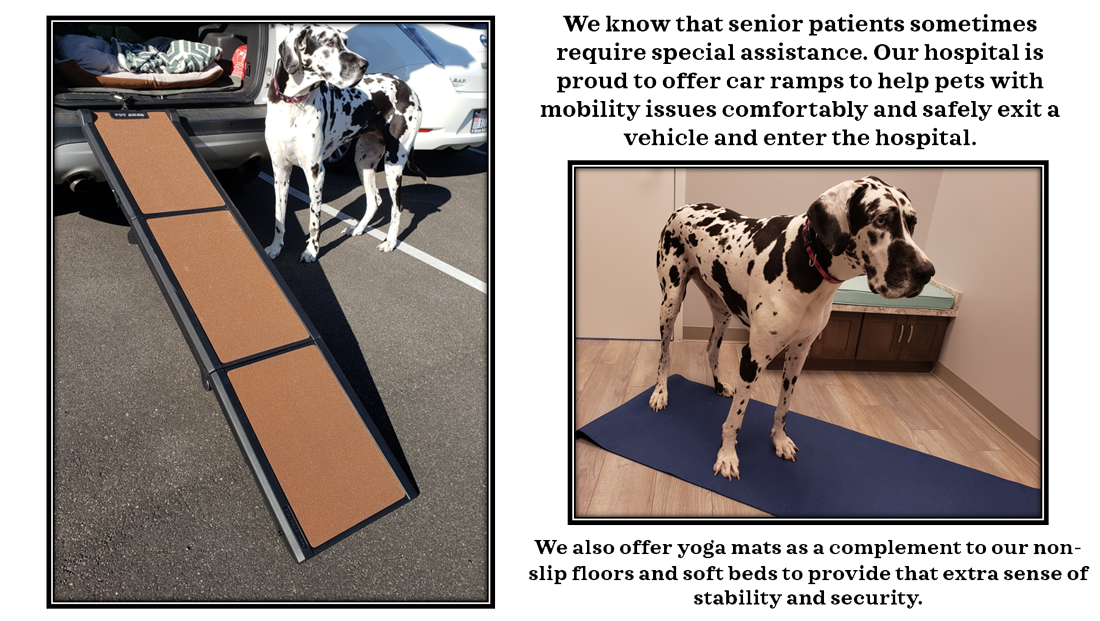Just like people, aging cats and dogs need special care! Good news: Improvements in veterinary care, diagnostics, and earlier intervention make it possible to enjoy pets longer.
For most breeds we consider your pet to be a senior when they are 7 years or older. The term "senior" can often carry a negative connotation and can also make us sad about our pet aging. It doesn’t have to be a bad thing that your pet is aging, and we can develop a senior care program for your pet that can help them remain vibrant and healthy throughout their older "wiser" years.
 We use senior testing to promote early detection and treatment of disease. This includes performing routing physical exams, blood work, and even x-rays so that we can discover problems early and provide treatment options that can help extend the life of your pet. Senior testing also helps establish normal baseline values for your pet, creating a point of comparison for the future.
We use senior testing to promote early detection and treatment of disease. This includes performing routing physical exams, blood work, and even x-rays so that we can discover problems early and provide treatment options that can help extend the life of your pet. Senior testing also helps establish normal baseline values for your pet, creating a point of comparison for the future.
Other Age-Related changes, such as arthritis, incontinence, and even senility can occur and we can provide treatment options that help alleviate discomfort and improve overall quality of life. Let us help your pet better transition into this new phase of their life with increased comfort and overall better health. Call us today to schedule a senior wellness check up!
Common Conditions in Senior Dogs and Cats
Arthritis
Arthritis is inflammation of joints and associated joint tissue. It commonly occurs with age. Signs may include difficulty getting up and down stairs, decreased activity, discomfort with lifting and handling, and aggression.
Diabetes
Diabetes is caused by a deficiency of insulin, which is needed to regulate the body’s blood glucose. Signs may include increased thirst and urination, weight loss, vomiting, and excessive appetite.
Thyroid Disease
In a broad sense, the thyroid is related to your pet’s metabolism. The thyroid can become overactive in cats (hyperthyroidism), and underactive in dogs (hypothyroidism). In cats, signs may include increased thirst, weight loss, increased appetite, increased energy, and intermittent chronic vomiting and diarrhea. In dogs, signs may include lethargy, weight gain, hair loss, and dry coat.
Kidney Disease
The kidneys are responsible for filtering out toxins and other metabolites and play a critical role in the body’s overall fluid balance. The kidneys can become less efficient at these processes as your pet ages which can lead to accumulation of toxins within the body. Signs may include increased thirst, urination, lethargy and potential vomiting.
Liver Disease
The liver is responsible for eliminating toxins, metabolizing drugs, and producing important proteins. The liver can become less efficient at all of these processes as your pet ages. Signs may include lethargy, vomiting or diarrhea, anorexia, weight loss, or abdominal distension.
We can use routine physical exams and blood work to discover these issues early and develop treatment plans that help extend the quality of life for your senior pet. If you notice any of these signs in your senior pet, we recommend scheduling an appointment to discuss further diagnostics and treatment options.
Special Accomodations for our Senior Pets








